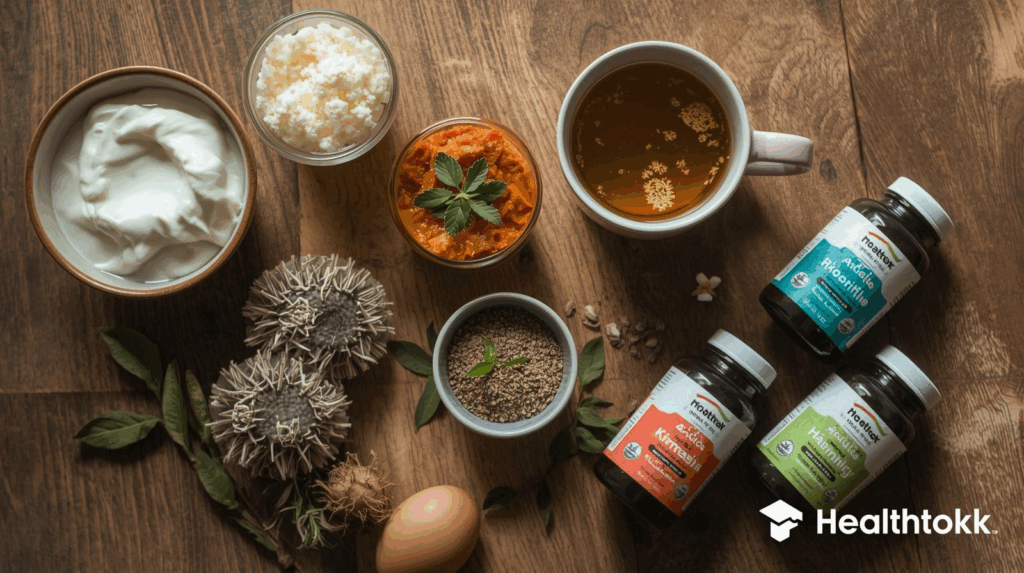How Stress Affects Gut Health (and What You Can Do About It)
A Science-Backed Guide by Healthtokk
🌿 Introduction
Stress and gut health are deeply connected — and at Healthtokk we emphasize how your mind, body, and digestive system all speak the same language. When life’s pressures mount, it’s not only your emotions that respond. Your gut health also takes the hit. You may notice more bloating, erratic digestion, mood swings, or loss of appetite when you’re stressed. That’s no coincidence — it’s your gut reacting to emotional stress.
In this comprehensive Healthtokk article, we’ll explore how stress affects gut health, the real problems it causes, the science behind them, and actionable solutions you can implement. If you haven’t yet, be sure to check out our earlier gut-health cluster articles:
-
Signs of an Unhealthy Gut & How to Spot Them Quickly (Backed by Science)
-
Foods That Support a Healthy Gut-Brain Connection (Backed by Science)
Understanding those pieces will give you the full picture — today we focus on stress, gut health, the gut-brain connection, and how to restore your balance.
🧠 The Science Behind Stress and Gut Health

Your gut and brain communicate through a network called the gut-brain axis. When you’re under stress, your body triggers the release of cortisol and adrenaline. These hormones influence gut motility, enzyme secretion, the composition of your gut microbiome, and intestinal permeability. IFM+2PMC+2
Research shows that chronic stress alters the gut microbiota, leading to dysbiosis and increased intestinal permeability (“leaky gut”) which in turn increases systemic inflammation and may affect brain chemistry. For example, one study found that stress reduced microbial diversity and shifted gut bacteria in ways that correlated with anxiety and depression. PMC+1
At Healthtokk, we view this as a key reason why stress and gut health cannot be separated: when your gut health is compromised, your emotional and physical well-being are both at risk.
🔄 How Stress Disrupts the Gut: The Real Problems
When stress continues unchecked, it triggers a cascade of gut health issues. Understanding these problems is the first step toward solutions.
Increased cortisol: Under stress, cortisol suppresses digestive enzyme production, slowing digestion and impairing nutrient absorption.
Reduced blood flow to the gut: When stressed, blood flow shifts away from your intestines toward “fight or flight,” causing bloating, discomfort, and slower gut motility.
Altered microbiome: Stress changes the composition of your gut flora — beneficial bacteria decline, harmful bacteria increase. A review found that psychological stress could significantly reduce beneficial gut microbes. Max Planck Society
Leaky gut / intestinal permeability: Multiple studies show stress can weaken tight junctions in your gut lining, enabling toxins and unwanted molecules to enter your bloodstream. This triggers immune activation, inflammation, and may influence brain function. ScienceDirect+1
Gut-brain feedback loop: As your gut health declines, it sends signals back to the brain, increasing anxiety, mood swings, cognitive fog, and other symptoms. This means stress affects gut health — and poor gut health fuels stress further.
At Healthtokk, we label these the core “stress and gut health” problems. Recognizing them can help you act.
⚖️ Signs That Stress Is Damaging Your Gut Health
Even before major symptoms emerge, your body may be showing signs your gut health is under stress. Watch for:
-
Frequent bloating or discomfort after meals
-
Unexplained constipation or diarrhea
-
Sudden sugar or junk food cravings
-
Persistent fatigue or brain fog
-
Low mood, irritability, anxiety
-
Skin issues like acne or eczema (linked to gut inflammation)
-
Weight fluctuations or loss of appetite
These signs closely mirror what we described in our Healthtokk article “Signs of an Unhealthy Gut & How to Spot Them Quickly.” If you notice several of these, your stress may be harming your gut health.
🧬 How Gut Health Influences Your Stress Response
The connection is two-way: not only does stress impact gut health, but your gut microbiome affects how your body handles stress. For instance:
-
About 90% of serotonin, a key mood regulator, is produced in your gut. Verywell Mind
-
Imbalanced gut flora reduces production of neurotransmitters (like GABA) and raises cortisol levels.
-
Studies have shown changes in gut microbiota are linked to anxiety and depression. PMC
At Healthtokk, we emphasise that restoring your gut health is as important for emotional resilience as it is for digestion.
🥗 How to Restore Gut Health Under Stress: Solutions

Here’s how you can proactively improve your gut health when stress strikes.
1. Prioritise Probiotic and Prebiotic Foods
Foods rich in probiotics (yogurt, kefir, kimchi, sauerkraut, miso) help replenish beneficial bacteria. Prebiotics such as garlic, onions, oats, and bananas feed those bacteria. Together, they rebuild your gut health ecosystem.
2. Use Proven Supplements
When diet alone isn’t enough, supplements can help. Here are some globally available products recommended by Healthtokk:
| Product | Benefit | Buy Link |
|---|---|---|
| Culturelle Daily Probiotic Capsules | Research-tested Lactobacillus rhamnosus for digestive and mood support Healthline+1 | Amazon – Culturelle |
| Seed DS-01 Daily Synbiotic | Multi-strain probiotic + prebiotic for gut-brain health Verywell Health | Seed.com |
| NOW L-Theanine + Magnesium | Supports nervous system calm and gut muscle function | Walmart – NOW |
| Nordic Naturals Omega-3 | Anti-inflammatory support for gut lining & brain | Amazon – Nordic Naturals |
💡 At Healthtokk, we remind you always to consult your healthcare provider before taking supplements.
3. Exercise Regularly
Physical activity increases blood flow to your digestive organs and supports microbial diversity. A 10-minute daily walk can support significant improvement in gut-brain health.
4. Prioritise Stress Management & Mindfulness
Techniques like meditation, breathing exercises, journaling, or yoga help reduce cortisol and support your gut-brain axis. Healthtokk encourages incorporating 10 minutes of mindfulness into your daily routine.
5. Get Quality Sleep
Gut bacteria follow circadian rhythms, so poor sleep can disrupt your gut health. Aim for 7–9 hours of consistent, quality sleep.
🌼 Natural Remedies for Stress-Related Gut Problems
| Remedy | How It Helps | Example |
|---|---|---|
| Chamomile Tea | Reduces cortisol and relaxes gut muscles | [Traditional Medicinals Chamomile – Amazon] |
| Ashwagandha | Adaptogen that lowers stress and supports gut barrier | [KSM-66 Ashwagandha – iHerb] |
| Omega-3 Fatty Acids | Lowers gut inflammation and supports brain health | [Nordic Naturals – Amazon] |
These remedies support the core Healthtokk strategy of targeting both stress and gut health together.
🌍 Global Perspective: Stress and Gut Health Statistics
-
More than 70 % of adults report digestive changes in times of high stress. The Times of India+1
-
People with chronic anxiety are 2.5× more likely to develop IBS or increased gut permeability. PMC
-
Stress management improvements have been shown to restore microbial diversity by up to 30 % in some studies. Frontiers
These figures underline why Healthtokk emphasises stress as a central factor in gut health.
💡 Key Takeaways
-
The link between stress and gut health is strong: stress disrupts your gut, and a compromised gut worsens your stress response.
-
Recognising the problems — like poor nutrient absorption, dysbiosis, leaky gut and mood issues — is the first step.
-
Solutions include diet changes (probiotics and prebiotics), targeted supplements, exercise, mindfulness and sleep.
-
Healthtokk recommends trusted global sources for supplements; check links and consult professionals.
-
Your wellness journey flourishes when you treat your gut with care, especially under stress.
🪴 Related Articles on Healthtokk
Continue reading within the Healthtokk gut-health series:
-
🧬 The Ultimate Guide to Gut Health (Parent article)
-
🚨 Signs of an Unhealthy Gut & How to Spot Them Quickly (Backed by Science)
-
🧠 How the Gut Influences Mood: Gut-Brain Axis Explained
-
🍎 Foods That Support a Healthy Gut-Brain Connection (Backed by Science)
Next in the cluster:
👉 Best Herbs and Natural Supplements to Heal the Gut (Clinically Proven in 2025)
🎯 Final Thoughts from Healthtokk
At Healthtokk, we believe true wellness begins in the gut — especially when you’re under stress. Stress may be unavoidable, but the damage it causes doesn’t have to be. By improving your gut health with targeted foods, supplements, and better lifestyle habits, you strengthen your digestion and your mental resilience. So, the next time you feel overwhelmed, bloated, or drained — remember: your gut is talking to you. Listen, nourish, and heal it.
This post is for informational purposes only and does not constitute medical advice. Always consult with a qualified health professional. Contact us for more details.
